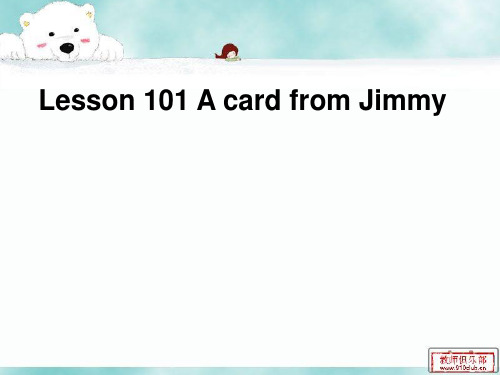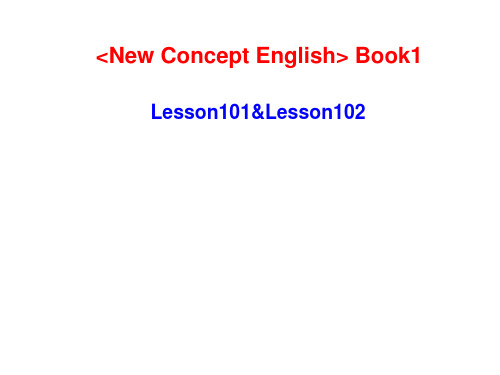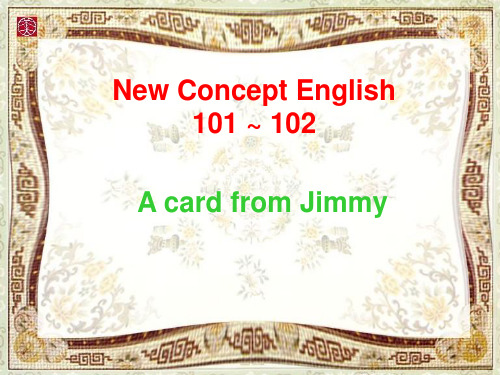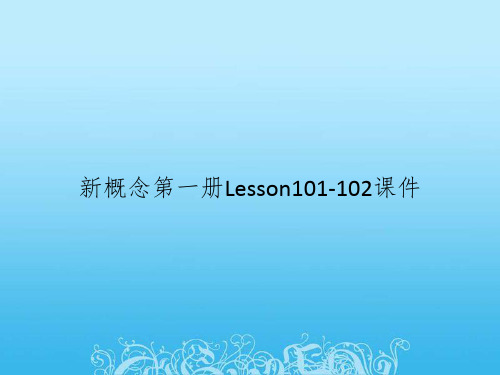新概念英语第一册第101课ppt课件
合集下载
新概念英语第一册101课课件

• He asked if he was my brother.
• Mr. Smith asked, “What is your name?”
• Mr. Smith asked what my name was.
学习交流PPT
18
• 如果直接引语为祈使句,变为间接引语时多用“名 词(代词)+不定式”结构。
Lesson 101 A card from Jimmy
Teacher:Vivian
学习交流PPT
1
• card
n. 明信片,卡片
学习交流PPT
2
youth n.青年
学习交流PPT
3
hostel n.招待所,旅馆
hotel
学习交流PPT
4
association n.协会
学习交流PPT
5
单词学习
越快越好
as soon as
一…就…
• 你一完成就告诉我
学习交流PPT
13
• write v. 写 我用铅笔还是用钢笔写? Shall I write in pencil or in ink? 用英文写 write in English write to sb. 给某人写信 我一个月给我家人写两封信。 I write to my family twice a month. write a will 写遗嘱 write back 回信
学习交流PPT
19
·
反意疑问句
• He doesn’t say very much, does he?
• 反意疑问句
• 由两部分组成,前面是一个陈述句,后面是一个 简略问句,中间用逗号隔开,反意疑问句可以用 来确认自己的判断,还可以用来表示惊讶,愤怒 等感情
• Mr. Smith asked, “What is your name?”
• Mr. Smith asked what my name was.
学习交流PPT
18
• 如果直接引语为祈使句,变为间接引语时多用“名 词(代词)+不定式”结构。
Lesson 101 A card from Jimmy
Teacher:Vivian
学习交流PPT
1
• card
n. 明信片,卡片
学习交流PPT
2
youth n.青年
学习交流PPT
3
hostel n.招待所,旅馆
hotel
学习交流PPT
4
association n.协会
学习交流PPT
5
单词学习
越快越好
as soon as
一…就…
• 你一完成就告诉我
学习交流PPT
13
• write v. 写 我用铅笔还是用钢笔写? Shall I write in pencil or in ink? 用英文写 write in English write to sb. 给某人写信 我一个月给我家人写两封信。 I write to my family twice a month. write a will 写遗嘱 write back 回信
学习交流PPT
19
·
反意疑问句
• He doesn’t say very much, does he?
• 反意疑问句
• 由两部分组成,前面是一个陈述句,后面是一个 简略问句,中间用逗号隔开,反意疑问句可以用 来确认自己的判断,还可以用来表示惊讶,愤怒 等感情
新概念英语第一册 Lesson101-102 (共20张PPT)

肯定回答: Yes, he can. 不,他会。 否定回答: No, he can’t. 是,他不会。
注意: 没有Yes, he can’t./ No, he can.这种回答哦!
回答为肯定→Yes, +肯定回答. 回答为否定→No, +否定回答.
试一试:
( D) 1. His sister had a bad cough, _________ she?
=> 简略问句的主语要用___代_词____。如:
e.g. John has gone to Beijing, hasn’t he? 他去北京了,不是吗? You don’t like cats, do you? 你不喜欢猫,是吗?
需注意:当反意疑问句前半句为否定句时,回答要根 据实际情况作答。 e.g. Jimmy can’t speak English, can he? 吉米不会说 英语,对吗?
__S_t_a_y _at_h_o_m_e_t_h_es_e_d_a_ys_______.
2. You’d better go to school on foot. __G_o__to_s_c_ho_o_l _on__fo_o_t ___________.
He says he’s just arrived in Scotland. He says he’s staying at a Youth Hostel. You know he’s a member of the Y.H.A.
Role Play
课文详解
(1) Read Jimmy’s card to me please, Penny. 结构:祈使句 常用表达:read sth. to sb. 意为
给“_某_人_读__…__________” 试一试:请把下列句子改为祈使句 1. You must stay at home these days.
注意: 没有Yes, he can’t./ No, he can.这种回答哦!
回答为肯定→Yes, +肯定回答. 回答为否定→No, +否定回答.
试一试:
( D) 1. His sister had a bad cough, _________ she?
=> 简略问句的主语要用___代_词____。如:
e.g. John has gone to Beijing, hasn’t he? 他去北京了,不是吗? You don’t like cats, do you? 你不喜欢猫,是吗?
需注意:当反意疑问句前半句为否定句时,回答要根 据实际情况作答。 e.g. Jimmy can’t speak English, can he? 吉米不会说 英语,对吗?
__S_t_a_y _at_h_o_m_e_t_h_es_e_d_a_ys_______.
2. You’d better go to school on foot. __G_o__to_s_c_ho_o_l _on__fo_o_t ___________.
He says he’s just arrived in Scotland. He says he’s staying at a Youth Hostel. You know he’s a member of the Y.H.A.
Role Play
课文详解
(1) Read Jimmy’s card to me please, Penny. 结构:祈使句 常用表达:read sth. to sb. 意为
给“_某_人_读__…__________” 试一试:请把下列句子改为祈使句 1. You must stay at home these days.
新概念英语第一册101102课精美课件课件

“Is he your brother?〞 he said.
He asked if he was my brother.
Mr. Smith asked, “What is your name?〞
Mr. Smith asked what my name was.
• 如果直接引语为祈使句,变为间接引语时 多用“名词〔代词〕+不定式〞构造。
• Winter has come too soon. • 冬天来得太早了
• The sooner, the better. • 越快越好 • as soon as 一…就… • 你一完成就告诉我
• Tell me as soon as you have finished.
• --write v. 写 • 请你把姓名,地址写在这里。 • Write your name and address here, please. • 你报告写好了没有? • Have you written the report yet? • 我用铅笔还是用钢笔写? • Shall I write in pencil or in ink? • 用英文写 • write in English • Write to sb. 给某人写信 • 我一个月给我家人写两封信。 • I write to my family twice a month.
直接引语和间接引语
• 直接引语就是直接引用说话人原来所说的 话,而间接引语就是原话的转述。
• 直接引语放在引号里,间接引语是把说话 人的原话变成宾语从句。
• 直接引语变间接引语须在人称,时态及地 点状语等方面作相应的变化。
1.如果直接引语为陈述句,变为间接引语时 常用附属连词that引导〔口语中可省略〕, 引述动常常用say, tell等。同时,概据主语 的要求,间接引语须在人称,时态及其它 方面作相应的变化。
He asked if he was my brother.
Mr. Smith asked, “What is your name?〞
Mr. Smith asked what my name was.
• 如果直接引语为祈使句,变为间接引语时 多用“名词〔代词〕+不定式〞构造。
• Winter has come too soon. • 冬天来得太早了
• The sooner, the better. • 越快越好 • as soon as 一…就… • 你一完成就告诉我
• Tell me as soon as you have finished.
• --write v. 写 • 请你把姓名,地址写在这里。 • Write your name and address here, please. • 你报告写好了没有? • Have you written the report yet? • 我用铅笔还是用钢笔写? • Shall I write in pencil or in ink? • 用英文写 • write in English • Write to sb. 给某人写信 • 我一个月给我家人写两封信。 • I write to my family twice a month.
直接引语和间接引语
• 直接引语就是直接引用说话人原来所说的 话,而间接引语就是原话的转述。
• 直接引语放在引号里,间接引语是把说话 人的原话变成宾语从句。
• 直接引语变间接引语须在人称,时态及地 点状语等方面作相应的变化。
1.如果直接引语为陈述句,变为间接引语时 常用附属连词that引导〔口语中可省略〕, 引述动常常用say, tell等。同时,概据主语 的要求,间接引语须在人称,时态及其它 方面作相应的变化。
新概念英语第一册101课课件

• ‘I have just arrived in Scotland and I’m staying at a Youth Hostel.’ just 1、刚刚(完成时态) 她刚刚把钥匙给我。 He has just given the key to me. 他刚刚去图书馆。 She has just gone to the library. 2、正要…,刚要… (进行时态) 他们刚要作弊, 老 师过来了。 They were just cheating. The teacher came here. 他正要离开,他的父母打电话了。 He was just leaving. His parents called.
translation
n.苏格兰 n.明信片 n.青年 n.招待所,旅馆 n.协会 adv.不久 v.写
• youth 1)n. 青年人,年轻人(单复数同形) 该国的青年人 一 般都有礼貌 The youth of the nation is polite in general. 2)青年(少年)时期,青春时期 他少年时代在美国度过 He spent his youth in the U.S.A 他年轻时学过意大利语。 He studied Italian in his youth. 3)青春
Q&A
1.What does he say ? He says he’s just arrived in Scotland. He says he’s staying at a Youth Hostel. 2.What is the Y.H.A? The Youth Hostels Association. 3.What else does he say? He says he’ll write a letter soon. 4.Why doesn’t say very much? He can’t write very much on a card. 5.Does grandmother seem pleased to get a card from Jimmy? Why or why not? No , he doesn’t. Because he doesn’t write very much.
新概念英语NCE1_Lesson101-102(共49页)课件

New words and expressions:
• card [kɑ:d] n. 明信片,卡片 • post card 明信片
credit card 信用卡
ID card 身份证
ID=identity / identification
Birthday Card
生日卡片
New Year card
write [rait] v. 写 •请你把姓名,地址写在这里。 •ite your name and address here, please. •用英文写 •write in English •write to sb. 给某人写信 •我一个月给我家人写两封信。 •I write to my family twice a month. •once- twice-three times
Lesson 101
A card from Jimmy
by Lynn
版权所有 违版必究
Dear Lynn,
I have just arrived in Beijing. I will come back in a week.
Love, Emma
What does Lucy say in the letter?
•2) [ U ]the time of life when a person is young •他少年时代在美国度过 •He spent his youth in the U.S.A.
•他年轻时学过意大利语。 •He studied Italian in his youth.
•3)[ U ] the state of being young
Grammar
直接引语: 直接引用说话人的话,并且加上双引号的。
新概念英语第一册101-102课PPT

He says he's just arrived in Scotland. He says he's staying at a Youth Hostel. You know he's a member of the Y.H.A.
GRANDMOTHER: The what? PENNY: The Y.H.A., Mum. The Youth Hostels Association. GRANDMOTHER: What else does he say? PENNY: 'I'll write a letter soon. I hope you all well.'
Lesson 102 He said he …
She says she …
They say they … 1 T: Look at number 3. I am cold. What's that? S: She says she is cold. 2 T: Number 5. I have a cold. What's that? S: He says he has a cold.
7 T: Number 15. We must repair this car. What's that? S: They say they must repair this car. 8 T: Number 6. I've got a headache. What's that? S: She says she's got a headache. 9 T: Number 12. We want some money. What's that? S: They say they want some money. 10 T:Number 3. I feel cold. What's that? S: She says she feels cold.
新概念英语第一册Lesson 101 PPT

He doesn’t say very much, much does he? 他没说多少,是吗?
•反义疑问句 • 步骤 • 1.将陈述句的句号变成逗号 • 2.将前面的陈述句改成一般疑问句 • 3.只保留一般疑问句的前两个词(动 词+主语) • 4.肯定句在动词后加否定的缩写 • 否定句保持不变
I have never been to the zoo!
Mary says she has been to the zoo for many times!
Mike says that he has never been to the zoo!
• I have just arrived in Scotland and I ’m staying at a Youth Hostel. I’m he’s • He says he’s just arrived in Scotland. He says he ’s staying at a Youth Hostel. he’s
练习
• Mr. Samuel isn’t English, is he?
• 塞缪尔先生不是英国人,是吗? • Yes, he is./No, he isn’t. • 不,他是英国人/对,他不是英国人。
我来背一背
Read what?/speak up He/write/soon
I/arrived/Scotland
双宾语结构 read sb. sth. = read sth. to/for sb.
你们还记得 我们学过哪 些词嘛?
直接引语转间接引语
Yeah!
Teacher says that we will go to the zoo tomorrow. We will go to the zoo tomorrow. Mary says she has been to the zoo for many times! I have been to the zoo for many times!
新概念英语第一册101-102课PPT

Lesson 102 He said he …
She says she …
They say they … 1 T: Look at number 3. I am cold. What's that? S: She says she is cold. 2 T: Number 5. I have a cold. What's that? S: He says he has a cold.
Lesson 102 A 1 She says she has shut the door. 2 He says he has put on his coat. 3 He says he has read this magazine. 4 They say they have spoken to the boss. 5 They say the sun has risen.
Grammar in use: 直接引语和间接引语
1 .直接引语就是直接引用说话人原来所说的话; 间接引语就是原话的转述。直接引语放在引号里, 间接引语是把说话人的原话变成宾语从句。 2 .间接引语中,宾语从句中的动词与主句中的主 要动词在时态上必须保持一致。一般来说,主要 动词用现在时,间接引语中可用现在时(包括一 般现在时、现在进行时、现在完成时)和将来时。 如:
Asking questions: Ake me if…?
1 T: Jimmy has just arrived in Scotland. S: Has Jimmy just arrived in Scotland? T: Where ⋯ ? S: Where has Jimmy just arrived? 2 T: Ask me if he's staying at a Youth Hostel. S: Is he staying at a Youth Hostel? T: Where ⋯ ? S: Where is he staying?
新概念一101课课件

5.The what?The Y.H.A., Mum. The Youth Hostels Association.
• • • •
什么? 青年招待所,妈妈。 青年招待所协会。 Y.H.A.是Youth Hostels Association的缩写。
6.What else does he say? • • • • • • 他还说什么了? 本句时态为一般现在时。 else其他的--用于特殊疑问词后---还有谁 who else What else do you want to buy? 你还想买什么?
Warm-up: A good beginning is half done.
良好的开始是成功的一半。
An hour in the morning is worth two in the evening.
一日之计在于晨。
Scotland card youth hostel association soon write(wrote, written)
• • • •
• • • •
arrive in + 城市/ 国名(大地点) 她昨天到了马德里。 She arrived in Madrid yesterday. arrive at +公共场所地点名称(airport, park, the station)(小地点) 我们十分钟前到达机场。 We arrived at the airport ten minutes ago. 他们刚刚到这个旅馆。 They have just arrived at the hotel.
clock
Text analysis and grammar focus
1.Read Jimmy’s card to me please, Penny. 彭妮,把吉米的明信片给我读一下。 read sth. to sb. 给某人读某物 =read sb. sth. Her mother is reading a story book to Lily. 她的妈妈正在给丽丽读一本故事书。 本句为祈使句。
新概念英语第一册Lesson101-102(共12张PPT)

I can't come to the party on Friday.
He says he can't come to the party on Friday.
My parents are very well.
He says his parents are very well.
John has been to New York.
you your yours yourself yourselves 二五变
主对主,宾对宾,物主对物主,反身对反身。 一随主 二随宾 第三人称不更新 一十变 二五变 三不变
I‘m going to learn Chinese.
He says he is going to learn Chinese.
Youth Hostel. You know he's a member of the Y.H.A. G: The what? P: The Y.H.A., Mum. The Youth Hostels Association. G: What else does he say? P: 'I'll write a letter soon. I hope you are all well.' G: What? Speak up,Penny. I'm afraid I can't hear you. P: He says he'll write a letter soon. He hopes we are all well.
1.read ...to…给…读 read sb sth
Read Jimmy's card to me.=Read me Jimmy's card.
2019年新概念英语第一册101课课件共33张PPT语文

• card
n. 明信片,卡片
• post card 明信片
Scotland shepherd dog
postcard
credit card 信用卡
an ID card 身份证
a birthday card
生日卡片
a new year card
新年贺卡
• Play cards • 打扑克
• He spent his youth in the U.S.A • 他年轻时学过意大利语。
• He studied Italian in his youth. • 3)青春 • association n. 协会 • 我父亲是牙医协会的会长。
• My father was the president of the dental association. • 在组织或者机构前要加定冠词the
宾语从句
• ‘I have just arrived in Scotland.’ • He says he’s just arrived in Scotland. • ‘I’m staying at a Youth Hostel.’ • He says he’s staying at a Youth Hostel. ‘I’ll write to you soon .’ • He says he’ll write a letter soon. ‘I hope you are all.’ • He says he hopes we are all well.
a headache
a toothache
反意疑问句
• 又叫附加疑问句,表示提问人的看法,没有把握, 需要对方证实。
• 反意疑问句由两部分组成:“肯定陈述+否定疑 问”或“否定陈述+肯定疑问” 简略问句的主语不用名词,应用相应的人称代词 It is beautiful, isn’t it?
新概念第一册Lesson101-102课件

• ‘I have just arrived in Scotland and I’m staying at a Youth Hostel.’
• just • 1、刚刚〔完成时态〕 • 他刚刚去图书馆。 • She has just gone to the library.
• 2、正要…,刚要… (进行时态) • 他正要离开,他的父母打 了。 • He was just leaving. His parents called.
• write(wrote, written) v. 写
• card n. 明信片,卡片 • post card 明信片
credit card 信用卡
an ID card 身份证
a birthday card
生日卡片
a new year card
新年贺卡
名片
• Play cards • 打扑克
?
• 9. Close the door, will you
?
• 10. Don’t be late, will you/won’t you?
• She told me that she had left her book in my room. 间接引语
• Mr. Smith asked, “What is your name?〞直接 引语
• Mr. Smith asked what my name was. 间接引 语
把直接引语改为间接引语
扑克
• --youth • 1)n. 青年人,年轻人〔单复数同形〕
• 该国的青年人 一 般都有礼貌 • The youth of the nation is polite in general.
She lost her youth. 她青春不再
新概念英语第一册第101课ppt课件

card, Mum.
1. He says he's just arrived in Scotland. 2. He says he's staying at a Youth Hostel. 3. You know he's a member of the Y.H.A. 4. I'm afraid I can't hear you. 5. He says he'll write a letter soon. 6. He hopes we are all well.
▪ 当主句一般疑问句时,宾从的连接词要 用if, whether.
▪ ‘Can you help me?’ She asked. ▪ She asked (me) if / whether I could help
her. ▪ 当从句中有or not, 只能用whether。
▪ 语序。这里要注意:虽然上面这个句 子是个问句,但是变成宾语从句谓语 仍然要用陈述句语序。
Jimmy is a member of Y.H.A. So, we’ll …
▪ Grandmother doesn’t think Jimmy says very much, does she?
▪ No ,she doesn’t.
A card from Jimmy
GRANDMOTHER: Read Jimmy's card to me please,
Do you know? Where does he live? Do you know where he lives.
小结宾语从句
• 1. 连接词: that (陈述句) if/whether(一般疑问句), what, when, where等(特殊疑问句)
新概念英语第一册101-102课课件33917PPT课件

(airport, park, the station)(小地 点) • 我们十分钟前到达机场。 • We arrived at the airport the minutes ago. • 他们刚刚到这个旅馆。 • They have just arrived at the hotel.
第25页/共31页
第17页/共31页
直接引语和间接引语
• 直接引语就是直接引用说话人原来所说的话,放在引号里。 • Vicky said "I have arrived in xi'an ." • 间接引语就是原话的转述,间接引语是把说话人的原话变成宾语从句。 • Vicky said that she had arrived in xi'an .
时态退一格直接引语间接引语一般现在时一般过去时过去时过去完成时现在完成时过去完成时过去完成时不变第20页共31页若引述的内容是客观事实科学真理格言现在习惯性动作间接引语中动词时态不变
本课内容
• 单词学习 • 直接引语和间接引语 • 课文讲解 • 翻译句子 • 作业
第1页/共31页
单词学习
• Scotland
2、 youth /ju:θ/ • 1)n. 青年人,年轻人(单复数同形) • 该国的青年人 一 般都有礼貌 • The youth of the nation is polite in general. • 2)青年(少年)时期,青春时期 • 他少年时代在美国度过 • He spent his youth in the U.S.A • 他年轻时学过意大利语。 • He studied Italian in his youth. • 3)青春
第10页/共31页
She lost her youth. 她青春不再
第25页/共31页
第17页/共31页
直接引语和间接引语
• 直接引语就是直接引用说话人原来所说的话,放在引号里。 • Vicky said "I have arrived in xi'an ." • 间接引语就是原话的转述,间接引语是把说话人的原话变成宾语从句。 • Vicky said that she had arrived in xi'an .
时态退一格直接引语间接引语一般现在时一般过去时过去时过去完成时现在完成时过去完成时过去完成时不变第20页共31页若引述的内容是客观事实科学真理格言现在习惯性动作间接引语中动词时态不变
本课内容
• 单词学习 • 直接引语和间接引语 • 课文讲解 • 翻译句子 • 作业
第1页/共31页
单词学习
• Scotland
2、 youth /ju:θ/ • 1)n. 青年人,年轻人(单复数同形) • 该国的青年人 一 般都有礼貌 • The youth of the nation is polite in general. • 2)青年(少年)时期,青春时期 • 他少年时代在美国度过 • He spent his youth in the U.S.A • 他年轻时学过意大利语。 • He studied Italian in his youth. • 3)青春
第10页/共31页
She lost her youth. 她青春不再
- 1、下载文档前请自行甄别文档内容的完整性,平台不提供额外的编辑、内容补充、找答案等附加服务。
- 2、"仅部分预览"的文档,不可在线预览部分如存在完整性等问题,可反馈申请退款(可完整预览的文档不适用该条件!)。
- 3、如文档侵犯您的权益,请联系客服反馈,我们会尽快为您处理(人工客服工作时间:9:00-18:30)。
that呢?
that 为连接词,做宾语可以 被省略
宾语从句(二)之直接引语和间接引语
▪ Penny says: “ He can't write very much on a card, Mum.”
GRANDMOTHER: The what?
PENNY:
The Y.H.A., Mum.
The Youth Hostels Association.
GRANDMOTHER: What else does he say?
PENNY:
'I'll write a letter soon.
I hope you all well.'
GRANDMOTHER: What? Speak up. Penny. I'm afraid I can't hear you.
PENNY:
He says he'll write a letter soon. He hopes we are all well.
'Love, Jimmy.'
GRANDMOTHER: Is that all?
'I have just arrive in Scotland and
I'm staying at a Youth Hostel.'
GRANDMOTHER: Eh?
PENNY:
He says he's just arrived in Scotland. He says he's staying at a Youth Hostel. You know he's a member of the Y.H.A.
GRANDMOTHER: Eh?
PENNY:
He says he's just arrived in Scotland. He says he's staying at a Youth Hostel. You know he's a member of the Y.H.A.
GRANDMOTHER: The what?
card, Mum.
1. He says he's just arrived in Scotland. 2. He says he's staying at a Youth Hostel. 3. You know he's a member of the Y.H.A. 4. I'm afraid I can't hear you. 5. He says he'll write a letter soon. 6. He hopes we are all well.
post card credit card Christmas card
play cards
soon adv. 不久
多久
How soon will you finish the work?
I’m going to see you soon.
sboeognoing to do 一wil般l d与o 将来时连用
as
so
ci
ate
associate
作为协会的人怎么能如此的吃呢?(指此人以前吃) w
rite write
我按照惯例写下来。
.
(5 )association(2 )Scotland (1 )card(3 )youth(4 )hostel (7 )soon (6 )write
card n. 明信片;扑克牌;纸牌
▪ Grandmother doesn’t think Jimmy says very much, does she?
▪ No ,she doesn’t.
A card from Jimmy
GRANDMOTHER: Read Jimmy's card to me pl
PENNY:
He says he'll write a letter soon. He hopes we are all well.
'Love, Jimmy.'
GRANDMOTHER: Is that all?
He doesn't say very much,
does he?
PENNY:
He can't write very much on a
PENNY:
The Y.H.A., Mum.
The Youth Hostels Association.
找找宾语从句
GRANDMOTHER: What else does he say?
PENNY:
'I'll write a letter soon.
I hope you all well.'
GRANDMOTHER: What? Speak up. Penny. I'm afraid I can't hear you.
4
1914年一战前夕,随着工业的发展,
城镇日趋嚣杂,环境受到污染。德国有
些青年为在大自然中寻求安静,骑自行
车驾小船结伴到农村,荒野,高山旅行,
途间架帐或民舍住宿。
hotel
Youth Hostel Y.H.A
青年招待所 Youth Hostel Association
Jimmy is a member of Y.H.A. So, we’ll …
He doesn't say very much,
does he?
PENNY:
He can't write very much on a
card, Mum.
Scot
land
Scotland
young youth
host
el
hostel
主人在侧房做了一个小旅馆。
so
on
soon
像这样在上面(作威作福)迟早要掉下来。
He’ll write a letter soon.
Please call me as soon as you arrive in Wu Han.
Don’t worry, I’ll call you sooner or later.
write v. 写
write down
write to
write off
标注
关,销
写下 写给 注销
A card from Jimmy
GRANDMOTHER: Read Jimmy's card to me please,
Penny.
PENNY:
'I have just arrive in Scotland and
I'm staying at a Youth Hostel.'
